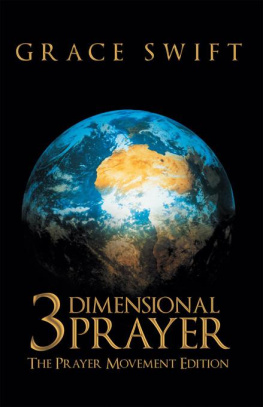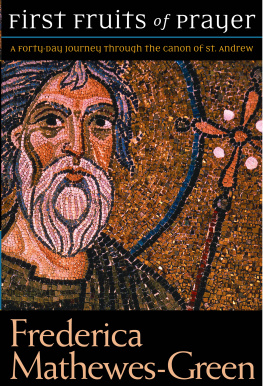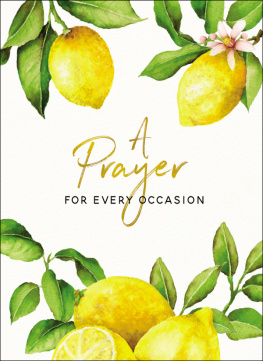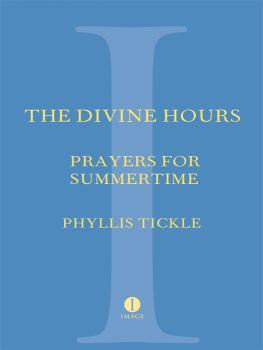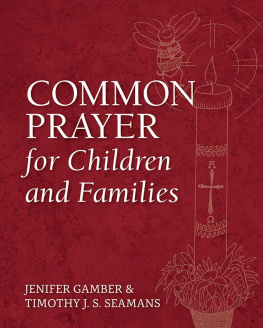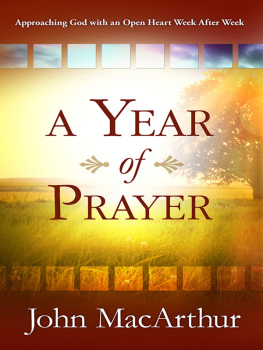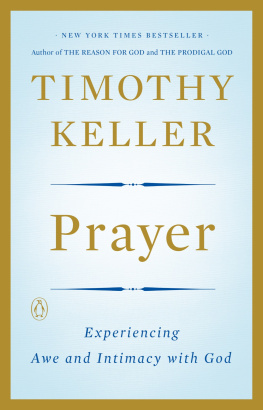Prayer Book
of the Early Christians

Prayer Book
of the Early Christians

Translated and Edited by
JOHN A. MCGUCKIN

Prayer Book of the Early Christians
2011 First Printing
Copyright 2011 by John A. McGuckin
ISBN: 978-1-55725-702-4
Scriptures, other than the Psalms, are the authors own paraphrases using the Revised Standard Version of the Bible or the original Greek.
The Psalm texts are the authors own emendations of the Grail Psalter (England), 1963, 1986 The Grail. All rights reserved.
Library of Congress Cataloging-in-Publication Data
Prayer book of the early Christians / translated and edited by John A. McGuckin.
p. cm.
Includes bibliographical references.
ISBN 9781557257024 (hard cover)
1. Prayers. I. McGuckin, John Anthony.
BV245.P785 2011
242.8--dc23
2011037126
10 9 8 7 6 5 4 3 2 1
All rights reserved. No part of this book may be reproduced, stored in an electronic retrieval system, or transmitted in any form or by any meanselectronic, mechanical, photocopy, recording, or any otherexcept for brief quotations in printed reviews, without the prior permission of the publisher.
Published by Paraclete Press
Brewster, Massachusetts
www.paracletepress.com
Printed in the United States of America
CONTENTS
PART 1
Ritual Offices of Prayer
for the Whole Day
_________
AN OFFICE OF EVENING PRAYERS AT DUSK
VESPERS (A Simple Rite of Lucernarium)
AN OFFICE OF NIGHT PRAYERS
COMPLINE
A SIMPLIFIED OFFICE OF MORNING PRAYERS
MATINS (Known in the East as the Rite of Orthros)
PRAYERS FOR LATE MORNING
THE OFFICE OF THE FIRST HOUR
PRAYERS FOR MIDDAY
THE OFFICE OF THE THIRD HOUR
PART 2
Rituals and Services of Prayer
for Different Occasions
_________
PART 3
Prayers of the Ancient Saints
_________
THE JESUS PRAYER
PRAYER OF THE HEART
A GUIDE AND INTRODUCTION
FOR THE USE OF THIS BOOK OF PRAYER
This book has been compiled mainly for the use of ordinary Christians in domestic circumstances. It is heavily based upon the ritual books of the Eastern Orthodox Church, to which I myself belong, but represents also the prayers of many worldwide Christians from ancient times: the Syrians of Antioch (where the name Christian was first used); the Copts and Ethiopians of Africa who were evangelized in apostolic times; the prayers and devotions of Roman, Greek, Russian, Armenian, and other Christian churches, as they have been recorded by the great saints down the ages. These are prayers that have been tried and proved.
They have more than withstood the test of time and are filled with the grace of the saints who first used them and passed them down to us. For this book, I have made new versions of all these ancient sources, trying to lift them up anew, like treasures from antiquity as it were, and polish them so as to gleam in modern, elegant English. All the time I have been moved to render the texts with an eye to poetically workable lines and stanzas. Almost all of these prayers were originally composed in the church with a lively ear for their assonancetheir artistic communal ability to express the hearts intentions before God by the grace of the artistry of language. This prayer book tries its hardest to be poetic without appearing to be such; to be elegant while at the same time modern; to be informal without being colloquial.
Many of the suggested services of domestic prayer can be said entirely by one person leading all the prayers. At certain times (such as prayers on the occasion of the death of a loved one), it is better to have one person who is able to lead the prayers in a quiet and calm voice, than it is to pass round the various parts, especially if many people present are incapable (because of grief for example) of really taking a leading role. At other times, a group of people can pass round the task of saying various parts. Each time the Psalms are written down in this book they are done so in a way that normally divides them up into verses of two lines. This is an easy way for half of a group (one side of a room, for example) to say one verse, and another side to make the (antiphonal) response. The Psalms version that has been generally used (with some small amendments) is the delightful Grail version, which I have loved since it first appeared in 1963 from that group of learned Catholic scholars and ascetics who first made it, emphasizing the poetic nature of the Psalms, for their own sung daily worship. The entire Grail Psalter is available for open access download on the Internet (typing Grail Psalms in Google will direct you to the site).
YOUR BASIC PRAYER KIT
When Christians pray, from time immemorial they have lit candles. The candle is a sign of the fire of the Holy Spirit. Their cheerful radiance (especially if at the time of prayer one dims the lights a little) becomes a little sacrament of the resurrection grace of Christ. The flame also serves to remind us of how pure and heartfelt our prayer is meant to be, even if, at times, we are praying in a doldrum and may hardly feel any grace at all. The candle reminds us that Christ and his Holy Spirit pray in and through us, unfailingly. They see the hearts intent and always draw close in time of prayer. Their prayer (in us, through us, over us) is never dim, always luminous. Each home can have a candle present, always ready at time of prayer. In addition to a candle, one might also wish to have a basic prayer kit of a cross (wooden or metal) and an icon of Christ, or the Virgin Mother with Christ.
Throughout this book, there appears a small cross + at the beginning of some of the lines, as well as at the start and completion of prayers. This is the mark where all present should make the sign of the cross over themselves. The name of the Father, Son, and Spirit is one name, the living name of the one God who is Trinity. This great and ancient prayer can be made anywhere as a sign of blessing over us or others, as a call for Gods protection and help. It is the prayer that seals all others. The ancient prophets throughout the Holy Scriptures taught that where the Name of God is, there is the presence of God too, and his active power. Where the cross is, no evil or harm can endure.
Most Orthodox homes have set aside a little corner of the house (often in the main room in the corner looking toward the east) that they call the Beautiful Corner, where one finds the family icons and the cross and the prayer books, and where a believer might stand at morning and night to say the prayers. It does not have to be in the eastern corner if this is not convenient. It is often better to be somewhere out of the way and quiet. In ancient times, the icons were often the most beautiful things a family possessed, and even the children were drawn to look at them: beauty attracting beauty. It is, after all, an old saying that gives us a good concept for Christian training of the young that the things you love as a child you will love all your life long. And what better than to have instilled even from childhood a heartfelt desire for prayer, a love of the beautiful so that prayer is not a chore or a burdensome task, but something that one can look forward to each day. Even when we may be in a time of dryness or despondency, if our prayer corner is bright, beautiful, radiant with candle flame and the sweet smell of incense, it can raise up our hearts, reminding us of the beauty of God, such that turning to prayer can serve as a radiant oasis even in a gloomy desert of a day.
Next page

